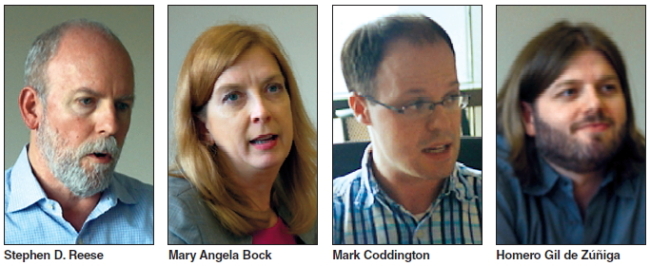Journalism schools focused on convergence
Speakers say journalists must be ‘Swiss Army knives,’ cultivating diverse skills such as multimedia and blogging
By Korea HeraldPublished : April 21, 2013 - 20:51

AUSTIN, Texas ― The media industry around the world is going through a wave of transformative changes and challenges. Major journalism schools in the United States are rushing to adapt to the new environment, and the University of Texas in Austin is no exception.
In fact, it runs one of the leading journalism schools in the United States in preparing students to tackle and embrace drastic changes such as the rise of social media.
“We are very much interested in technology because it’s fundamentally transforming professional journalism,” Stephen D. Reese, professor at the School of Journalism of the University of Texas at Austin, told The Korea Herald. “We have to ask questions about professional identity (of journalists) and what the future role of journalism is, as the boundaries are breaking down between professionals and citizen journalists.”
Reese, also associate dean for academic affairs at the College of Communication, said the state of the media at large is in the middle of upheavals and global changes, and he finds it important to draw suggestions and ideas from professional journalists.
A case in point is none other than the International Symposium on Online Journalism held April 19-20, organized and hosted by the University of Texas. The conference offered a rare venue for professionals to share their views on key issues.
One of the hot issues facing journalists and students alike is the greater use of multimedia and technologies. For traditional print journalists, a growing list of tech-related skills required for today’s journalists in the new media environment seems overwhelming.
For this reason, Reese said the School of Journalism at the university is stressing “convergence” in its curriculum, particularly multimedia. Journalism students, he said, should learn how to shoot photos and videos and write up cross-platform, multimedia-rich news articles.
Mary Angela Bock, an assistant professor there, said the curriculum had changed dramatically a year ago in favor of the multimedia-centered programs.
Previously, she said, classes were classified into time-honored categories such as print media, TV and radio. “But they are now gone,” Bock said, adding that such specialization has been replaced by cross-platform programs.
“Even in a course focused on writing, we require students to incorporate multimedia elements,” Bock said. “We want our students to become Swiss Army knives,” she added, referring to the need for versatile skills to become competent journalists.
Blogging is one of such essential skills, and Bock’s students are also encouraged to set up their own blogs and build up their online brand. Blogging, in other words, is not a choice but a must for journalists to forge better communication with their audiences.
Mark Coddington, a blogger and Ph.D. student at the journalism school, pointed out the blurred boundaries involving blogging and professional media. “The relations between traditional media and blogosphere have changed quite a bit over the past five years,” said. “There are many bloggers who have begun to work as professionals, while news organizations have been doing blogging, so it’s difficult to speak of separate traditional media and blogosphere.”
Bloggers may not be good at “boots-on-the-ground” journalism, Coddington said, but they tend to have areas of strength, which can draw journalists’ attention to certain ignored yet important issues. At the same time, traditional news organizations play a mutually beneficial role by sharing its competitive edge such as the ability of originating new stories, he said.
So is the combination of blogging and traditional news the right way to go? Not really, said Homero Gil de Ziga, assistant professor of journalism at the University of Texas. “Nobody knows a right business model,” he said. What’s certain, though, is that people consume more information than ever before, and the key might lie in how media companies contextualize information and content properly, Gil de Ziga said.
By Yang Sung-jin, Korea Herald correspondent
(insight@heraldcorp.com)
-
Articles by Korea Herald





![[Herald Interview] 'Amid aging population, Korea to invite more young professionals from overseas'](http://res.heraldm.com/phpwas/restmb_idxmake.php?idx=644&simg=/content/image/2024/04/24/20240424050844_0.jpg&u=20240424200058)












![[KH Explains] Korean shipbuilding stocks rally: Real growth or bubble?](http://res.heraldm.com/phpwas/restmb_idxmake.php?idx=652&simg=/content/image/2024/04/25/20240425050656_0.jpg&u=)

